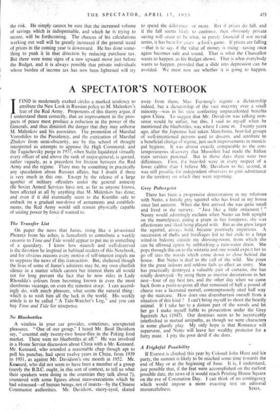A SPECTATOR'S NOTEBOOK
IFIND in moderately exalted circles a marked tendency to attribute the New Look in Russian policy to M. Malenkov's fear of the Red Army. Proponents of this theory argue, if I understand them correctly, that an improvement in the pros- pects of peace must produce a reduction in the power of the Generals, and thus diminish the danger that they may unhorse M. Malenkov and his associates. The promotion of Marshal Voroshilov to the Presidency, and the extrication of Marshal Zhukov from semi-obscurity, are by this school of thought interpreted as attempts to 'appease the. High Command; and the Tugachevsky purge in 1937, when Stalin liquidated virtually every officer of and above the rank of major-general, is quoted, rather vaguely, as a precedent for friction between the Red Army and the regime. There may be something in practically any speculation about Russian affairs, but I doubt if there is very much in this one. Except by the release of a large number of military offenders under the general amnesty tife Soviet Armed Services have not, as far as anyone knows, been affected at all by anything that M. Malenkov has done; and even if it did eventually seem to the Kremlin , safe to embark on a gradual run-down of armaments and establish- ments, the Red Army would still remain physically capable of seizing power by force if wanted to. ._


































 Previous page
Previous page